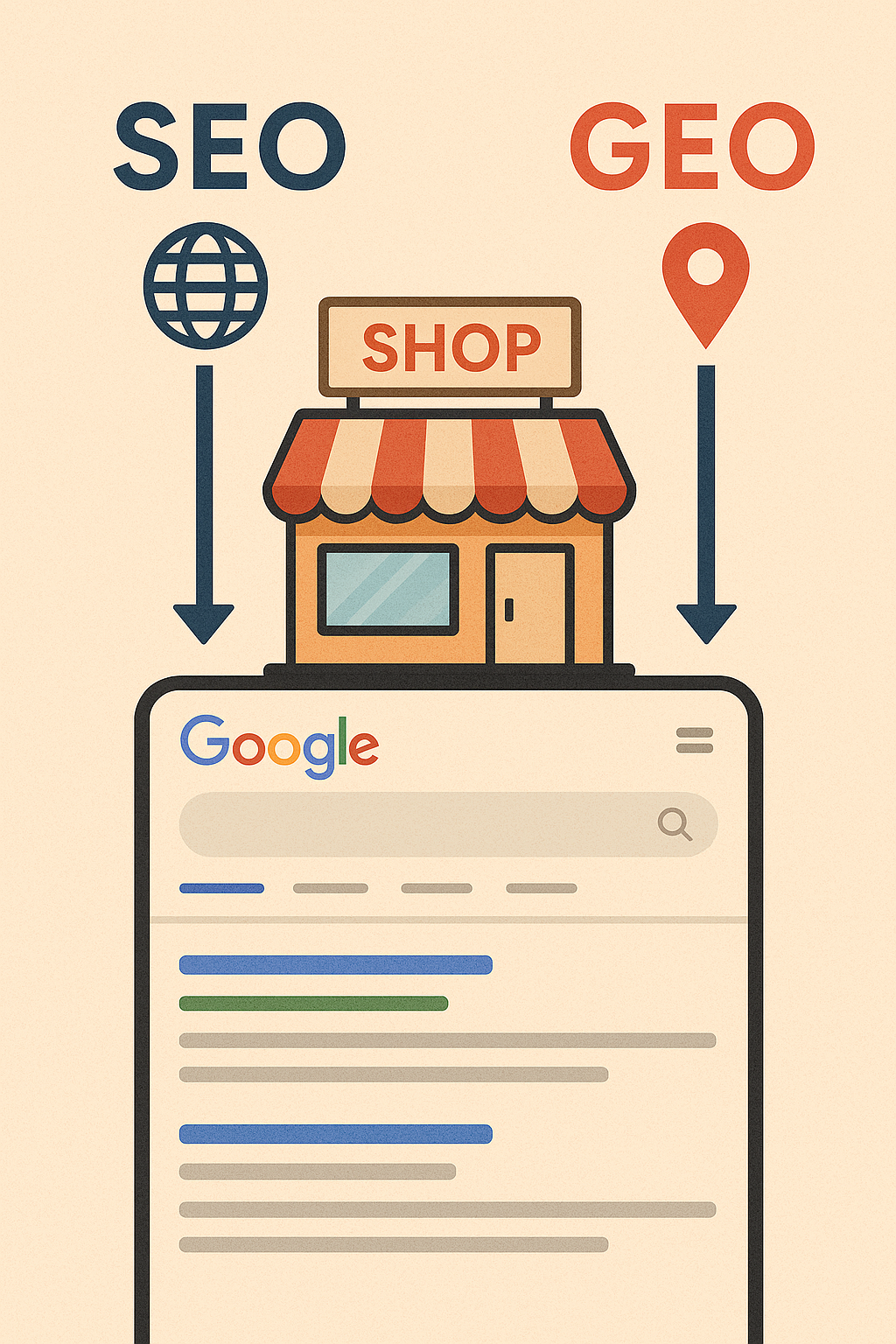Modern GEO V/S Traditional SEO
– A Quick Guide for Small Business Owners
The digital marketing world is changing rapidly. While traditional SEO has long been the backbone of online visibility, a new approach—Generative Engine Optimization (GEO)—is redefining how small businesses connect with their customers. For entrepreneurs working with limited budgets and high competition, understanding this shift is essential.
Understanding the Shift
Traditional SEO: The Familiar Foundation
Traditional SEO focuses on improving website rankings on search engines through keyword research, on-page optimization, backlinks, and technical performance. It’s been effective for years, allowing small businesses to target local audiences and build credibility over time. However, it often requires months of consistent effort before delivering results.
Thank you for reading this post, don't forget to subscribe!What is GEO?
Generative Engine Optimization (GEO) is a modern method of optimizing content for AI-powered platforms like ChatGPT, Google’s SGE, and Perplexity. Unlike traditional SEO that targets search engine result pages (SERPs), GEO ensures your content is cited, referenced, or shown directly in AI-generated responses.
For example, when someone asks an AI, “What’s the best bakery near me?”, GEO-optimized content increases the chance of your business being mentioned directly in the response.
Traditional SEO vs. GEO
Traditional SEO
Benefits:
- Builds long-term brand authority
- Offers measurable traffic and conversion tracking
- Works universally across industries
- Proven tools and techniques available
Challenges:
- Requires 6+ months for visible results
- Manual, ongoing optimization
- Prone to algorithm changes
- Highly competitive keyword environment
GEO
Benefits:
- Faster content updates and optimization
- Aligns with conversational, voice-based queries
- Offers “zero-click” visibility in AI responses
- Keeps your brand relevant in AI-driven platforms
Challenges:
- Still evolving, with limited tools
- Less direct control over AI citations
- Doesn’t always lead to direct traffic
- Requires knowledge of AI systems and structured data
Why GEO Matters for Small Businesses
Efficient Use of Limited Resources
Traditional SEO often demands more time and budget. GEO, on the other hand, uses AI tools to generate, refine, and optimize content faster. This frees up time for business owners to focus on growth and customer service.
Local Market Edge
AI platforms now prioritize local and relevant content. So, when a user searches with local intent, AI systems pull data from location-based sources and FAQs. By optimizing for GEO, small businesses can appear in these conversational results—even before someone visits their website.
First-Mover Advantage
Larger brands are still adjusting to GEO. Small businesses that adopt it early can get ahead, building presence on AI platforms before the space becomes saturated.
Real-Life Examples
Restaurant
A traditional SEO strategy might target “best pizza in Delhi.” With GEO, the restaurant publishes content answering “Where can I get wood-fired pizza tonight?” AI systems pick up on such content and mention the restaurant directly.
Accountant
Instead of just targeting “accountant near me,” a GEO strategy includes FAQs like “What documents do I need to file taxes?” or “How do I choose the right accountant for my business?” These help AI models include the firm in responses.
E-commerce
Rather than just optimizing product pages, GEO involves publishing buying guides or comparison articles that AIs reference when a user asks, “What’s the best running shoe under ₹3000?”
Actionable GEO Strategies for Small Business Owners
1. Create Conversational Content
Focus on natural language questions people are likely to ask. Think about how users talk to AI assistants. Use phrases like “how to,” “where can I,” or “what is the best.”
2. Use Structured Data
Implement schema markup on your site to help AI platforms understand your business details—like hours, pricing, reviews, and locations.
3. Build Detailed FAQs
Create question-and-answer sections on your website that address common customer concerns. AI models love structured, useful information.
4. Prioritize E-E-A-T
Ensure your content shows Experience, Expertise, Authoritativeness, and Trust. This boosts your credibility for both SEO and GEO.
5. Localized Content
Write about local events, news, or neighborhood topics. This helps AIs link your business to relevant local queries.
6. Optimize for Voice Search
Use natural, long-tail phrases. AI platforms often power voice assistants, so tailor your content to match how people speak, not just how they type.
7. Develop Authoritative Content
Publish original guides, case studies, or expert commentary. This increases the likelihood that AI will reference your content.
8. Maintain Consistency
Ensure your business information is accurate and consistent across all online platforms, directories, and listings.
Combining SEO and GEO
Don’t ditch traditional SEO—combine it with GEO:
- Keep optimizing for local SEO while integrating conversational content
- Use keyword research and also include voice-friendly queries
- Continue building backlinks while also creating citation-worthy content
- Maintain technical SEO health along with schema implementation
Tracking Your Success
Measure traditional metrics like traffic, bounce rate, and conversions, but also look at:
- Mentions in AI tools (via test queries)
- Visibility in voice search
- Number of FAQs being used in AI responses
- Structured data implementation health
Final Thoughts
AI-assisted search is not just the future—it’s already here. GEO gives small businesses a golden opportunity to rise above the noise without needing massive budgets. By blending the old (SEO) with the new (GEO), small businesses can build lasting digital visibility.
Ready to Take the Next Step?
At Digiwize.in, we help small businesses make sense of this shift. We combine the best of traditional SEO with cutting-edge GEO techniques, helping your brand shine in both search engines and AI platforms.
Let us handle the technical complexity while you focus on what matters—growing your business.
Contact us today for a free consultation.
Your future customers aren’t just searching anymore—they’re asking AI. Make sure you’re the answer.

